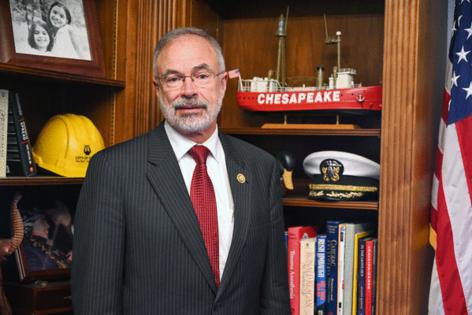Maryland Rep. Andy Harris and D.C. have a long, personal war over marijuana and he's not budging
Published in News & Features
WASHINGTON – Eleanor Holmes Norton’s language was pointed.
Rep. Andy Harris is “trying to overrule the will of my constituents,” said Norton, Washington D.C.’s delegate to the U.S. House. The Maryland Republican, she added, is “violating his own principles regarding local control of local affairs.”
Norton was referring to Harris tucking language into federal budget legislation that prohibited the District of Columbia from spending money to carry out a marijuana legalization law approved by its voters.
That was 2014, but it might well have been yesterday.
In every congressional session since — including the current one — the “Harris Rider” has appeared in appropriations bills, and Norton and marijuana legalization advocates have vehemently railed against it. Their longstanding back-and-forth is as predictable as the humidity that returns to Washington each summer.
The rider means people can possess or use limited amounts of marijuana at home in Washington, but no one can sell it for recreational use.
“The congresswoman always advocates to remove it,” said Sharon Eliza Nichols, the communications director for Norton, now 89. “She speaks against it continuously — she references it specifically on the House floor, at press conferences, and at external speaking engagements whenever she speaks about the D.C. appropriations bill.”
Harris, 68, whose district includes the Eastern Shore, Harford County and a portion of Baltimore County, is a Johns Hopkins-trained anesthesiologist who has long crusaded against marijuana use. He has an outsized role in District of Columbia governance as a member of the House Appropriations Committee, which has a powerful say over D.C. finances.
Harris says marijuana has been linked to a host of physical and social ills.
“The Drug Enforcement Administration and the Food and Drug Administration have held long-standing opinions that marijuana is a psychoactive drug that is both addictive and harmful,” Harris said in a written statement to the Baltimore Sun.
“Despite a lack of much scientific research showing safety and growing evidence of harm, over three dozen states legalized the recreational use of marijuana,” he said. “I am glad to see that the Trump administration recognized the importance of the Harris Rider by including it in their FY26 Budget Request and look forward to seeing the Harris Rider enacted into law again in this year’s appropriations process.”
Washington Mayor Muriel Bowser said she opposes “all congressional interference in the lives and affairs of Washingtonians,” in a statement from her office on Tuesday.
Maryland voters approved a ballot referendum in 2022 to legalize marijuana for adults, and sales were permitted beginning in July of the following year.
Marijuana remains classified, along with heroin and LSD, as a Schedule I controlled substance, meaning it is illegal at the federal level. States such as Maryland acted independently in legalizing it, and federal law enforcement has generally concentrated its efforts on “criminal networks involved in the illicit marijuana trade,” according to the Congressional Research Service.
President Joe Biden’s administration had proposed reclassifying marijuana, which would have removed some restrictions — on medical research, for example — although it still wouldn’t have been declared the drug legal federally.
But President Donald Trump’s administration has not moved to downgrade the drug from Schedule 1, even though Health and Human Services Secretary Robert F. Kennedy Jr. had pledged to “decriminalize cannabis at the federal level” while a presidential candidate in 2023. HHS did not return messages seeking comment about its plans.
The battle between Harris and marijuana legalization activists seemed to get personal after the congressman’s rider was first introduced.
In April 2018, former Washington head shop owner Adam Eidinger rented a brick rowhouse in the congressman’s district in Salisbury so he could vote against Harris and organize others to do the same.
Eidinger, 51, helped push Initiative 71, the ballot measure approved by voters in 2014 to legalize marijuana in Washington for recreational use. He also often showed up at Harris’ public events, asking repeatedly why Harris thought he knew more than District voters about what is good for them.
Eidinger and his fellow activists tried to imbue their rallies and events with creativity. They displayed inflatable joints outside the White House and distributed cannabis at Trump’s first inauguration in 2017.
Harris would not relent.
“Andy Harris is totally out of touch. It’s frustrating on so many different levels,” Eidinger said this week.
“I’ve given up on trying to change these guys’ minds. We have to vote in guys we can trust,” he said.
_____
©2025 The Baltimore Sun. Visit at baltimoresun.com. Distributed by Tribune Content Agency, LLC.







Comments